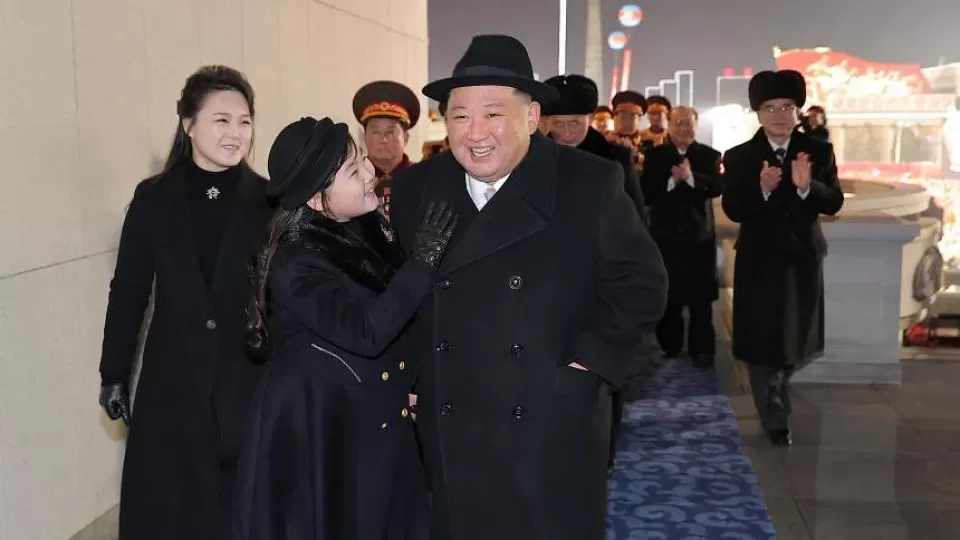March 2, 2023
SEOUL – The massive military parade in Pyongyang on Feb. 8 lived up to North Korea’s reputation as a “theater state.” Monster missiles rolled through the brightly illuminated Kim Il Sung Square; impeccable columns of marching soldiers shouted loyalty to their Supreme Leader and his sacred bloodline; and a sea of spectators cheered and wept with joy.
But the most memorable image was a child, Kim Ju-ae, standing at center stage alongside her father, Supreme Leader Kim Jong-un. The spectacular celebration of the 75th anniversary of the Korean People’s Army turned into a skillfully choreographed, nocturnal prop for her presence.
Equally surreal was the scene of her first public appearance at a missile launch site last November. What is the world’s most secretive country trying to say? Kim Ju-ae is thought to be only 9 or 10 years old. Is she a new propaganda tool to remind everyone that her mythicized family lineage is intact and positioned? Furthermore, has she been chosen to be the fourth-generation leader in the Kim dynasty? If so, why reveal it now?
These questions naturally prompt speculation about the fate of her aunt, Kim Yo-jong, the younger sister of Kim Jong-un. She has been known as the country’s de facto second-in-command and regarded as the heir apparent. Yet, she did not appear at the military parade with her brother and niece, while Ri Sol-ju, the first lady, walked behind them.
Shortly after the celebration, North Korean authorities reportedly began to force girls and women named Ju-ae to change their names. Incredulous as it may sound, North Korea forbids its people from sharing the same first names with their leaders. Ju-ae has now become banned in the country ruled by a virtual monarchy, as were the names of Korea’s kings and princes centuries ago.
In another move to solidify the “respected” daughter’s place in its cult of personality, the North has released a series of postage stamps carrying photos of Kim Jong-un and his beloved daughter posing before Hwasong-17, the North’s most advanced ICBM (intercontinental ballistic missile) capable of reaching the US mainland.
Contrary to widespread conjectures that the sudden rise of Kim’s young daughter should mean the downfall of his once-powerful sister, there also are cautious voices warning against hasty conclusions. Ju-ae is Kim’s second child. The eldest is known to be a boy, who has never been publicly seen. North Korea is still a deeply patriarchal society. A son is typically expected to take over the family business. Many would say that the sister has never been next in line. The son may be officially named the successor in due time.
Whichever is the case, Yo-jong should know better than anyone that her position as the most relied confidante to her brother could be precarious if she coveted more power. She has witnessed bloody power struggles in her family. In 2017, her half-brother, Kim Jong-nam, was assassinated at an airport in Kuala Lumpur after years of living abroad in exile. In 2013, Jang Song-thaek, her uncle by marriage and the second most powerful person in the North’s leadership, was executed on charges of treason and corruption.
Yo-jong developed an aptitude for the family business; she was interested in politics and diplomacy, or so thought her father, the Dear Leader Kim Jong-il. In 2007, she started her career as a junior cadre of the Workers’ Party of Korea, mostly assisting her father and brother behind the scenes.
It is said that during those early years in her career, Yo-jong was groomed for a leadership role by her aunt, Kim Kyong-hui, the only daughter of Kim Il-sung, the country’s founder, and the only sister of Kim Jong-il, the second leader. Kyong-hui performed the same supporting role for her own brother and probably knew the challenges Yo-jong would face engaging in politics.
Kim Kyong-hui filled a range of positions, most notably as director of the Light Industry Department of the Workers’ Party of Korea. An army four-star general, she was also a member of the party’s exclusive Political Bureau. Yo-jong also took a seat later. They are the only women ever admitted to the powerful body.
Kim Kyong-hui and her husband, Jang Song-thaek, mentored Kim Jong-un in the initial years after he succeeded his father, who died in December 2011. But two years later, Jang was accused of being a counterrevolutionary, stripped of all his posts and executed by a firing squad within a week. By that time Jang and his wife are said to have been estranged. Kim Kyong-hui disappeared from public view a few months before her husband was killed. She was rumored to have had a fatal stroke, heart attack, committed suicide, or have been ordered to be poisoned. But six years later, she reappeared, though politically inactive.
In 2018, Kim Yo-jong became the first, and to date the only, member of the Kim family to cross the border to South Korea since the Korean War, leading the North’s delegation to the Winter Olympics in Pyeongchang. She drew an outpouring of attention from the South Korean public, reigniting hopes of peace on the peninsula. Regrettably, she soon turned to hostile rhetoric against Seoul and Washington, as the US-North Korea summit for denuclearization in Hanoi, Vietnam fell apart. She reportedly led the demolition of the inter-Korean liaison office, built in the border city of Kaesong with South Korean taxpayer money.
Many people still remember her role in the inter-Korean and US-North Korea summits held during the brief period of detente. Today, as military tensions escalate in the region, anxiety grows over possible armed clashes triggered by accident or bad decisions by leaders. Instability due to rivalry in leadership, whether in Seoul or Pyongyang, will likely exacerbate crisis.
There certainly are roles women in power can fill in delicate steps toward peace. It would be wise to take advantage of diplomatic experience and skills accumulated at historic events to explore new opportunities for dialogue and reconciliation.


